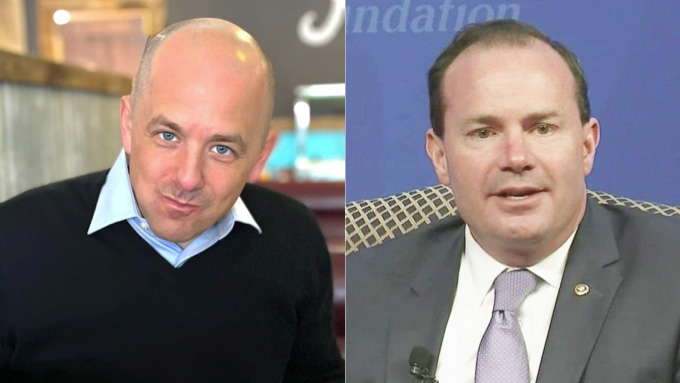Independent candidate Evan McMullin (left) and Sen. Mike Lee (R-UT) are rivals for Lee’s seat in the U.S. Senate.
SALT LAKE CITY – Inflation is bound to be a hot topic when the Senate race between incumbent Sen. Mike Lee (R-UT) and independent challenger Evan McMullin finally heats up after Labor Day.
McMullin touts a seven-point plan to curb inflation.
That scheme includes incentivizing the return of critical manufacturing to America; reducing reckless government spending; encouraging Americans to return to work safely; raising domestic oil production and refinery capacity; increasing investment in more independent and cleaner energy sources; reducing or elimination unnecessary tariffs; and, passing balanced-budget legislation.
With some exceptions, that sounds remarkably like the Democrats’ recently passed $700 billion Inflation Reduction Act (IRA). That legislation, which Republicans claim was cynically mis-named, includes more a than $350 billion investment in so-called “green new deal” initiatives and an expansion of the Department of Energy. It also earmarks $80 billion for an expansion of the Internal Revenue Service and the imposition of a 15 percent minimum business tax on corporations earning more than $1 billion a year.
Not surprisingly, McMullin says that there are parts of the new law that he supports and some parts with which he disagrees.
The problem with the IRA is that it does nothing to cure inflation, according to Lee.
Others authorities agree.
While Democrats hailed the IRA’s benefits, analysis by the Wharton School of Business at the University of Pennsylvania suggests that the bill would have no impact on inflation until 2028, when the measure would reduce inflation by 0.1 percent. The Wharton economists called that “… statistically indistinguishable from zero.”
The non-partisan Congressional Budget Office agreed that the IRA’s delayed affects would be “negligible at best.”
Lee says that the IRA law would never have passed if his main solution to inflation had been adopted by Congress earlier this year.
In March, Lee introduced the Preventing Runaway Inflation in Consumer Expenditures (PRICE) Act in the Senate.
That legislation would require a 60-vote majority of Senators to approve new federal spending measures when the nation’s inflation rate is at or above 3 percent.
In July, the national inflation rate stood at 9.1 percent.
If the PRICE Act had been adopted by Congress, Lee argues the Inflation Reduction Act would never that passed the Senate with a 50-50 tie vote broken by Vice President Kamala Harris.
“Congress has become a trust fund baby that doesn’t understand the value of a dollar,” Lee explains. “The PRICE Act is the recognition that sometimes you need to take away their credit card.
“This insatiable spending machine is now costing Utahns $881 dollar more a month then they paid last year,” he adds. “That’s on top of what they already pay in taxes.”
Realistically, Lee’s proposal had only a slim chance of passage in the Senate and none in the House, at least until the unlikely event that both chambers are controlled by Republicans following the mid-term election in November.
Lee’s other proposals to curb inflation are the Stopping Hindrances to Invigorate Ports and Increase Trade (SHIP IT) and the Helping Open Underutilized Space to Ensure Shelter (HOUSES) acts.
The SHIP IT Act would help to ease the nation’s supply chain crisis and counter rising inflation by simplifying or suspending federal regulations on ports, ships and trucks.
The HOUSES Act would help units of the federal government to address housing supply and affordability issues in their jurisdictions.
After Labor Day, McMullin and Lee will be in a “woulda, shoulda, coulda” horse race to convince voters that their vision might reduce the historic levels of inflation.

